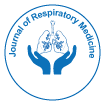当社グループは 3,000 以上の世界的なカンファレンスシリーズ 米国、ヨーロッパ、世界中で毎年イベントが開催されます。 1,000 のより科学的な学会からの支援を受けたアジア および 700 以上の オープン アクセスを発行ジャーナルには 50,000 人以上の著名人が掲載されており、科学者が編集委員として名高い
。オープンアクセスジャーナルはより多くの読者と引用を獲得
700 ジャーナル と 15,000,000 人の読者 各ジャーナルは 25,000 人以上の読者を獲得
抽象的な
Patients with Severe Asthma may have Impaired Cardiovascular Reserve: A Case-Control Study
Farren B S Briggs
Background: Although asthmatics may present reduced exercise capacity, data on their cardiovascular responses during exercise testing have been scarcely investigated. The aim of this pilot case-control study is to test: a) whether double product (DP), an index of cardiovascular reserve, differs among patients with severe and mild-moderate asthma, and b) whether DP is associated with asthma control level, physical activity (PA) and exercise capacity, in asthmatics population.
Materials and Methods: A group of patients with severe asthma (group S) and a matched group of patients with mild-moderate asthma (group M) was studied. All participants completed asthma control and physical activity (IPAC) questionnaires, lung function measurements and six-minute walk test. The exercise capacity (as 6-minute walk distance (6MWD) and corresponding work), the Borg Dyspnea, the rating of perceived excursion and the average PA METS were recorded.
Results: A total of 18 patients were studied. DP at exercise end was significantly lower in group S, compared to group M (16412.2±4732.1 vs. 18594.8±3984.4 mmHgXbpm; p=0.041) and was moderately associated with % predicted 6MWD (r=0.592; p=0.001). Group S patients were also presented with lower moderate intensity PA, compared to group M, while exercise capacity was similar between the groups. Asthma control level had no impact on exercise capacity or PA parameters.
Conclusion: Patients with severe asthma may have impaired cardiovascular reserve as established by DP, even when exercise capacity is indifferent from patients with milder disease. As an easy-to-assess parameter, DP may offer further information in the functional evaluation of these patients.

 English
English  Spanish
Spanish  Chinese
Chinese  Russian
Russian  German
German  French
French  Portuguese
Portuguese  Hindi
Hindi